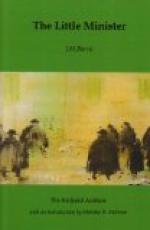To most of us, I suppose, has come some shock that was to make us different men from that hour, and yet, how many days elapsed before something of the man we had been leapt up in us? Babbie thought she had buried her old impulsiveness, and then remembering that from the top of the field she might see Gavin returning from church, she hastened to the hill to look upon him from a distance. Before she reached the gate where I had met her and him, however, she stopped, distressed at her selfishness, and asked bitterly, “Why am I so different from other women; why should what is so easy to them be so hard to me?”
“Gavin, my beloved!” the Egyptian cried in her agony, and the wind caught her words and flung them in the air, making sport of her.
She wandered westward over the bleak hill, and by-and-by came to a great slab called the Standing Stone, on which children often sit and muse until they see gay ladies riding by on palfreys—a kind of horse—and knights in glittering armour, and goblins, and fiery dragons, and other wonders now extinct, of which bare-legged laddies dream, as well as boys in socks. The Standing Stone is in the dyke that separates the hill from a fir wood, and it is the fairy-book of Thrums. If you would be a knight yourself, you must sit on it and whisper to it your desire.
Babbie came to the Standing Stone, and there was a little boy astride it. His hair stood up through holes in his bonnet, and he was very ragged and miserable.
“Why are you crying, little boy?” Babbie asked him, gently; but he did not look up, and the tongue was strange to him.
“How are you greeting so sair?” she asked.
“I’m no greeting very sair,” he answered, turning his head from her that a woman might not see his tears. “I’m no greeting so sair but what I grat sairer when my mither died.”
“When did she die?” Babbie inquired.
“Lang syne,” he answered, still with averted face.
“What is your name?”
“Micah is my name. Rob Dow’s my father.”
“And have you no brothers nor sisters?” asked Babbie, with a fellow-feeling for him.
“No, juist my father,” he said.
“You should be the better laddie to him then. Did your mither no tell you to be that afore she died?”
“Ay,” he answered, “she telled me ay to hide the bottle frae him when I could get haed o’t. She took me into the bed to make me promise that, and syne she died.”
“Does your father drina?”
“He hauds mair than ony other man in Thrums,” Micah replied, almost proudly.
“And he strikes you?” Babbie asked, compassionately.
“That’s a lie,” retorted the boy, fiercely. “Leastwise, he doesna strike me except when he’s mortal, and syne I can jouk him.”
“What are you doing there?”
“I’m wishing. It’s a wishing stane.”
“You are wishing your father wouldna drink.”




